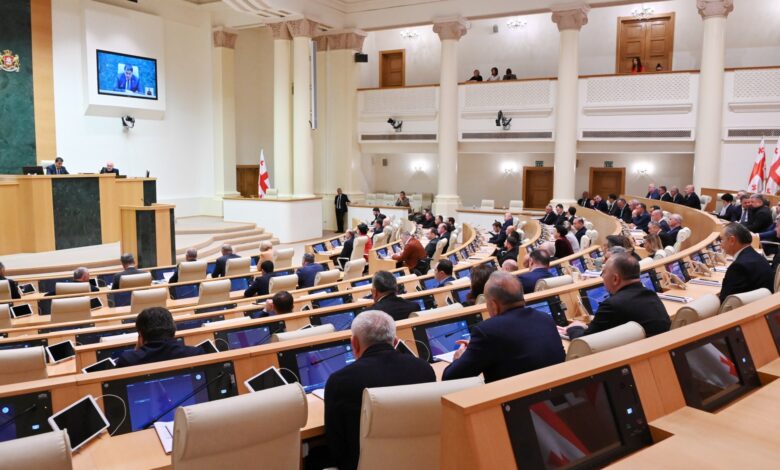
GD Parliament Adopts Law Extending Party Ban to Individuals
The Georgian Dream parliament has approved, in its final reading, a legislative package that would strip individuals “associated” with parties declared unconstitutional of their passive voting rights, including the right to found or join political parties, run in elections, or hold public office.
The amendments, feared to enable arbitrary targeting of a broad range of political parties and individual opponents of the ruling party, follow repeated signals from Georgian Dream that it intends to use the damning report of the one-party parliamentary commission in its Constitutional Court appeal to ban the United National Movement (UNM), the former governing party, as well as virtually all major opposition forces it labels as the “collective UNM.”
Under the amendments to Article 23 of the Law on the Constitutional Court of Georgia, which provides for the annulment of a party’s registration if its establishment or activities are declared unconstitutional by the Court, the restrictions will now extend to “individuals associated with this political party.” Such individuals will be prohibited from founding, leading, or joining a political party; serving in its executive or supervisory bodies; holding state-political or political office; or assuming leadership positions in constitutional bodies.
The amendments also allow for the termination of mandates in parliament or other representative bodies, as well as the removal of such individuals from party lists in general elections, if requested by the plaintiff in the constitutional claim.
The Criminal Code was also amended as part of the package to introduce fines for parties that fail to comply with, or obstruct, the execution of Constitutional Court decisions banning such persons from numerous political activities.
Relevant changes were also made to the Law on Citizens’ Political Associations and Georgia’s Electoral Code. These changes allow authorities to deny registration to parties that include such individuals as leaders or members, bar those individuals from running in local or parliamentary elections, and disqualify parties or revoke party lists containing them during relevant elections. The amendments to the Law on Political Associations of Citizens further prohibit such persons from making donations to political parties.
The new changes follow the earlier legislative package adopted in May, which granted the Constitutional Court authority to ban opposition groups whose leadership, goals, or activities are deemed identical to those of an already-banned party. The changes authorized the Court to ban a political group whose aim is to “overthrow or change Georgia’s constitutional order by force, undermine the country’s independence, violate its territorial integrity, engage in war or violence propaganda, incite national, regional, religious, or social strife.”
Fears of Arbitrary Application
Announcing the changes, Georgian Dream officials pledged that they will be submitting a claim to the Constitutional Court “in the near future.” The ruling party figures have also repeatedly indicated that while the claim is directed at the UNM, all other major forces, including Lelo for Georgia and Gakharia for Georgia, will be affected.
Georgian Dream Prime Minister Irakli Kobakhidze told Georgia’s Public Broadcaster on October 15 the appeal would ultimately target “up to ten parties, including smaller ones.” The criterion, he explained, was that “whoever has been continuously involved in sabotage against the state together with this bloody party or force will, of course, also be affected by this appeal,” adding that “the exact list will be made public in a couple of days.”
As for the individual members facing a ban from political activities, according to Gorduladze, they will also include individuals who are not necessarily members of the relevant parties. “These are members, representatives of the ruling circle, or they could just as well not be party representatives, not have party tickets in their pockets, but through their activities be fully aligned with the party’s goals or ensure that the party’s politics are put into practice,” Gorduladze told parliament on October 15.
The Georgian Young Lawyers’ Association (GYLA), one of the country’s key human rights watchdog, warned that the changes risk “significant democratic erosion,” arguing that the line between safeguarding democracy and suppressing political pluralism “is extremely fragile.” GYLA said the proposed restrictions on individuals associated with banned parties contradict both the Georgian Constitution and international standards, “disproportionately and indefinitely limit individual rights, which, in the long term, could lead to the disappearance of the political spectrum.”
The new laws have sparked concern across the opposition spectrum, with even UNM’s fiercest opponents, including Irma Inashvili of the nativist Alliance of Patriots, warning they could be used to target all political groups. “Can’t you understand that, with the supposed motive of fighting the already dissolved and vanished Natsebi [UNM party], in the end they will come after all of us?!” – Inashvili wrote on Facebook.
Also Read:
- 13/10/2025 – Ruling Party Announces Further Crackdown on Protests, Opposition
- 02/07/2025 – Failure to Pay Protest Fines to Lead to Detention for Repeat Acts
- Repression in Numbers